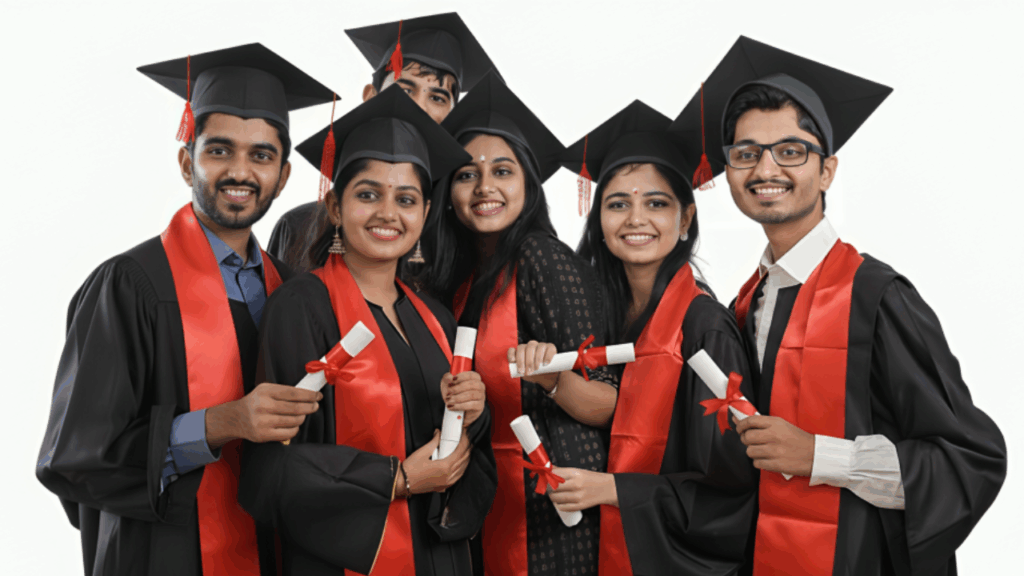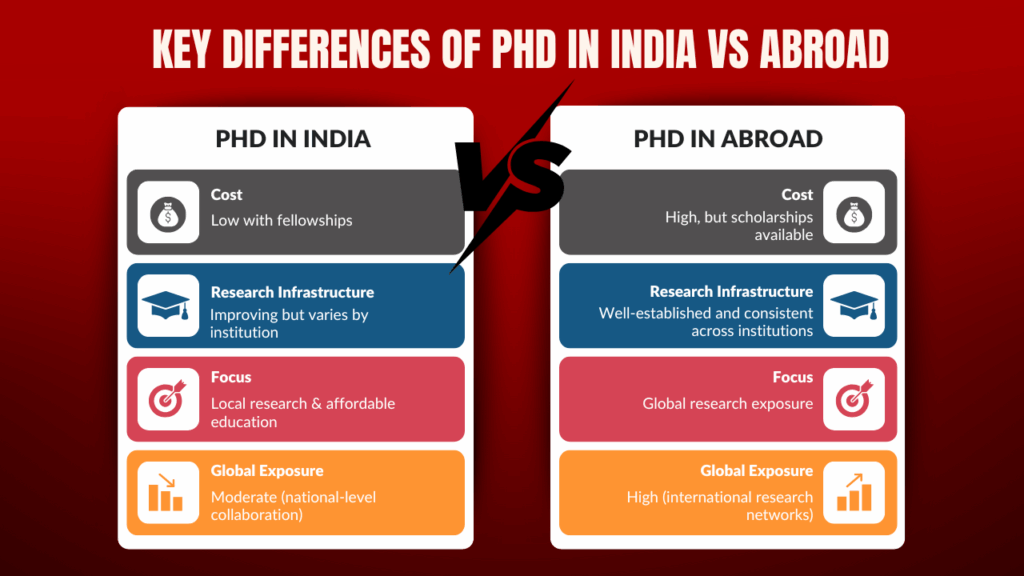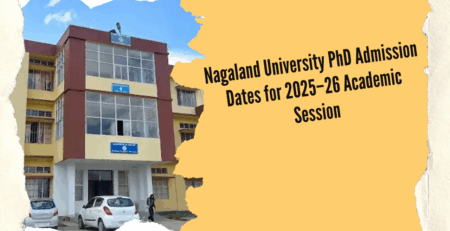PhD in India vs Abroad: Trends, Challenges & What Every Researcher Must Know?
Kenfra Research - Bavithra2025-11-11T17:22:31+05:30Pursuing a PhD is one of the most significant decisions in an academic career. It’s not just about earning the title of “Doctor” it’s about contributing original research, building expertise, and shaping future innovations. For Indian students, the choice between doing a PhD in India vs Abroad can be a tough one.
Both options come with their own benefits, challenges, and long-term career impacts. In this blog, we’ll explore the latest trends, opportunities, and realities of pursuing a doctoral degree in India versus abroad and what every aspiring researcher should know before applying.
PhD in India vs Abroad: Key Trends, Pros, and Cons Explained
PhD in India:

India has made great strides in higher education over the last decade. With premier institutes like IITs, IISc, IISERs, and central universities, the country now offers quality PhD programs across various disciplines from engineering and science to humanities and social sciences.
Key Trends in PhD in India
- Growing Research Ecosystem: Government initiatives like PMRF (Prime Minister’s Research Fellowship) and INSPIRE have been launched to support talented researchers financially.
- Focus on Publications: Indian universities increasingly emphasize publishing in reputed international journals, which helps students gain visibility.
- Interdisciplinary Research: There’s a growing interest in cross-disciplinary studies for instance, AI in healthcare, or economics with data science.
- Industry Collaboration: Although still developing, partnerships between academia and industry are improving, especially in technology and applied sciences.
Advantages of Doing a PhD in India
- Lower Cost: The overall cost of education and living is much cheaper than most foreign countries.
- Government Fellowships: Many institutes provide monthly stipends, making it financially viable.
- Cultural Familiarity: You’re working in your home environment, with fewer cultural or language barriers.
- Emerging Research Opportunities: With initiatives like “Make in India” and “Digital India,” research funding in science and technology is expanding.
Challenges in India’s PhD System
- Limited Research Infrastructure: Not all institutions have access to world-class labs or advanced resources.
- Longer Duration: PhDs in India often take longer due to administrative delays and slow evaluation processes.
- Guidance Quality: The mentor-student ratio can be high, meaning less personalized supervision.
- Job Market Uncertainty: While academia is saturated, industry R&D opportunities are still growing.
PhD in Abroad:

For many students, doing a PhD in abroad in countries like the USA, UK, Germany, Canada, or Australia is seen as the gateway to global exposure, advanced research facilities, and a diverse academic environment.
Trends in International PhD Programs
- Research Funding: Universities abroad attract huge research grants, offering well-funded PhD projects.
- Innovation-Driven: Emphasis is placed on innovation, critical thinking, and solving real-world problems.
- Global Collaboration: Students often work on international projects with access to global research networks.
- Structured Programs: Most Western universities have structured coursework, progress evaluations, and timelines to ensure timely completion.
Benefits of Doing a PhD in Abroad
- World-Class Facilities: Access to advanced labs, libraries, and equipment enhances research quality.
- Exposure to Global Academia: You collaborate with leading researchers and scientists worldwide.
- Better Career Opportunities: A PhD from a reputed global university opens doors to both academic and industry careers.
- Cultural and Professional Growth: Living abroad helps build adaptability, independence, and communication skills.
Challenges of Pursuing a PhD in Abroad
- High Cost: Tuition and living expenses can be steep, especially without a scholarship.
- Intense Competition: Getting admission and funding in top universities is highly competitive.
- Cultural Adjustment: Adapting to a new country, education system, and lifestyle can be challenging.
- Visa & Post-Study Work Rules: Immigration policies vary, affecting long-term plans.

Comparing PhD in India vs Abroad
This comparison shows that both paths have value — it depends on your research goals, funding access, and long-term career vision.
Career Prospects After PhD
After a PhD in India
Most graduates pursue academia assistant professor roles, research associateships, or postdocs. However, the private sector is now valuing PhD talent more, particularly in:
- Data Science & AI
- Pharmaceuticals & Biotech
- Policy and Think Tanks
- EdTech & Research Consulting
After a PhD in Abroad
Career opportunities are broader and often higher-paying. Graduates can enter:
- Academia or postdoctoral research
- R&D divisions in tech and biotech firms
- Policy, consulting, or international development organizations
- Entrepreneurship and innovation sectors
Many return to India with valuable experience, contributing to teaching, research leadership, or startup ecosystems.
Tips for Aspiring Researchers
- Start Early: Identify your research interest during your master’s degree.
- Build a Strong Profile: Publish papers, learn research tools, and participate in conferences.
- Apply for Scholarships: Whether in India or abroad, funding can ease your journey.
- Talk to Current PhD Scholars: Their experiences can give real insight.
- Focus on Quality, Not Quantity: Choose a university with strong faculty and resources over just a big name.
Conclusion
Whether you pursue your PhD in India or abroad, remember that success depends less on geography and more on passion, persistence, and purpose. A PhD is not just a degree — it’s a journey of discovery, resilience, and personal growth.
Choose the environment that inspires you to think independently, collaborate widely, and create meaningful impact through your research. With the right mindset and preparation, both India and abroad can lead you to a fulfilling research career. Kenfra Research offers end-to-end support from proposal drafting to publication to help you excel at every stage.
Frequently Asked Questions
1. Which is better: PhD in India or Abroad?
It depends on your goals. India is more affordable with strong research opportunities, while studying abroad may involve higher costs.
2. What are the main challenges of doing a PhD in India?
Limited funding, infrastructure gaps, and delayed evaluation are common issues.
3. What are the challenges of doing a PhD abroad?
High costs, cultural adjustments, and strict academic standards can be challenging.
4. What factors should I consider before choosing where to do my PhD?
Consider cost, research facilities, supervisor quality, publication opportunities, and long-term career goals.
5. Can I work while doing a PhD abroad?
Yes, most countries allow part-time work during a PhD, but with limited hours.










Leave a Reply